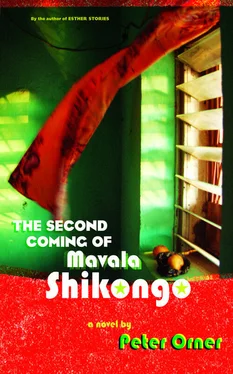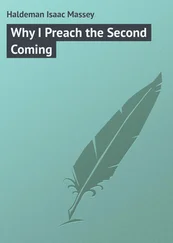The dry yellow veld is moving. It takes a long stare to see that it’s a herd of springbok leaping, as one. No one can take this away from me. Because it’s real. It’s grace. The Green Hills of Africa. There isn’t a green hill in this entire country. Who needs green anything? The springbok are leaping toward the long shadows of the Erongos.
“Look,” I say.
She watches for a while. We’re out of the dagga I stole from Pohamba’s new stash. We’re sharing her last van Ryn. Her knees under the tablecloth are like small bumps. Tomo’s on the edge of awake. I can hear him, his pre-wake snorfle. He’s onto us now. Mavala’s bribes have become less effective. Yesterday, after she topped his pap with cinnamon and brown sugar, he knocked it over.
She hands me the last nub of cigarette.
“What? You want to go on safari? They have these tours out of Windhoek, why don’t you —”
“Fuck off.”
She lifts her neck a little and holds it toward the sun with her eyes closed.
“Three yet?”
She doesn’t answer.
The sun belligerent, slackless. She rolls over on her back and talks. “Up at the camp we used to hunt springbok in the jeep, drunk off peach schnapps. We wouldn’t shoot. It was part of the game not to shoot. You had to separate one from the herd and ram it down. Someone in the unit learned it from a Boer farmer. A good thing about the Boers. You can always blame your sins on them. Springbok have the tenderest meat. They say it tastes better when it’s bloody, but that’s a lie.”
“Did you get this from Pohamba?”
I watch her. She digs the nail of her thumb into her cheek.
“It wasn’t easy. You know, buck zigzag. You had to be careful not to hit trees. Harder because we did it at night, without lights, because the planes patrolled —”
“You did it at night?”
“Yes.”
“A few things I’d like to do at night.”
She holds her hand over her mouth. Maybe she winces, it’s hard to tell in the glare.
“You think I’m on vacation?”
She doesn’t raise her head.
“You think I don’t know I’m on vacation?”
She doesn’t answer. She looks back at the place where the buck had been leaping.
“Once, I drove. When I hit her, I didn’t hit her hard enough, only wounded her. She staggered away. I chased her again, rammed her down again. She was so quiet. I remember wanting her to scream, whimper, something, anything, but she didn’t. Like this was natural — as if all her life she expected to be crushed to death by a jeep full of Marxists drunk off peach schnapps.”
She holds her face to the sun again, holds it there for a while. I’m drowsy. I reach for her. She winces.
Words in a small moon of light. History, at night, by torch, is the guiltiest of pleasures. Turn the page and there’s always more mayhem. In 1827, at Moordkoopie, south of Okahandja, an Orlam chief ordered the hands and feet of two hundred women captives lopped off so he could have their silver bangles. They were the wives, daughters, and concubines of his enemy. Couldn’t he have simply shouted: All right, ladies, take off those beautiful bangles or I’ll kill you? Do I repeat myself? How much is too much when there’s always another page? Why is the only rule that innocents pay?
Theophrastus said throwing a stone is less fatiguing than throwing emptiness. Don’t I know it. I talk in my head, and even I don’t listen. And my wife? While I mutter she sleeps, and even then she grasps the blankets as if they contain work she could get done in a dead hour. How do you say that even when she’s asleep your wife’s hands crave creation?
Speak to me, won’t you speak to me? I want to know of the pain in your hands. You carry a potato in your pocket. You think I haven’t seen you rub it? Is being born alone our transgression? My wife has hands and feet. She wears a thin gown that hangs loosely off her thinning body. Talk to me. Tell me about the pain in your hands.
You want it in words, everything in words. All right, then, here are words:
My hands are His hands, and I don’t call it pain. Now come to bed.
MAGISTRATE MCHUGH: I have come to see how you people live. I have heard you have had a very hard time during the latest drought, but hope you will soon recover.
FREDERICH MUKAUAMBI: We greet the magistrate. We are glad to see the magistrate here today. We have no rain and there is nothing left for the stock to eat. The people are shouting for water. The dams are dry. May we not trek to the east?
MAGISTRATE MCHUGH: No. All the ground you are thinking about has now been occupied and there is no further land available. Both the Europeans and the natives are in the same position and must depend on Providence — it is all we can do.
LOT OPPOSEMAB: We have nothing more to say.
At this stage permission was given to smoke.
— From the minutes of the quarterly meeting at the Otjimbingwe Native Reserve, presided by Magistrate M. J. McHugh, Esq., 16 February 1949.
Line going around Goas: How do you know Mavala Shikongo’s war stories are true?
Because she never tells any.
“War,” I say. “Now.”
“All right.” She pauses. She runs her tongue around her lips twice. “War. Yes. I remember. You are woman, they said. Woman! The men gave many speeches saying we were the soul and the strength of the movement. A commander would say, ‘Ladies, your Kalashnikov is an extension of your arm. Now, go do the wash. Go teach the little ones school. Wait, before you go, my darling, bring me a tea. Three sugars!’”
“That’s not a war story.”
“Isn’t it? What about this? I’d been sent to scout the food lorry. A good job for a woman. It was days late. We were living off refried pap and chocolate bars. Sometimes UNITA ambushed the lorries, so we never knew when, or if, the food would come. I walked about three kilometers from camp to wait. I was leaning against a tree when a man, one of ours, came out of the bush. He wasn’t a commander. He was only a new recruit. He’d just come up from the Kavango. I outranked him three levels. He raised a pistol at me and told me to drop my Kalashnikov. I told him he didn’t need a gun. Comrade, I said, we’re all here together. Long camp days, long camp nights. I think I insulted him by the suggestion. He wanted it by force or not at all. So he went away.”
“He did?”
“Yes.”
“Were you serious?”
“About what?”
“You know, giving yourself.”
“I don’t know.”
“You believed in it? That you were all comrades?”
“Listen, I’m tired.”
“Of what?”
“Of talk.”
“I’m only asking.”
“All right, I shot him. When he was turned away, I picked up my gun and shot him. Do you like that story better? Or should I try another? I have other versions.”
She rolls away from me. I watch the drought for a while. I look at the trails the cows have made across the veld, the way they loop and crisscross and join and separate again. I shake her.
“Was that guy Tomo’s father?”
Only her face turns back toward me. “Where did you — no — God, no.” And out of nowhere she smiles in a way I hadn’t seen. The way people do. When they’re remembering a face, another face?
“Why don’t you tell me anything?”
“I just did.”
“Tell me more.”
“No.”
Читать дальше












